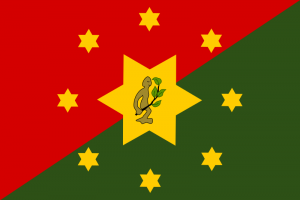Language/Agarabi/Vocabulary/Days-of-the-Week
Hi Agarabi learners! 😊
In this lesson, we will be learning the days of the week in Agarabi. Knowing these words will help you communicate more effectively with speakers of Agarabi. We will also be exploring some interesting cultural facts about the Agarabi language and culture. If you have any questions or suggestions, please don't hesitate to share them in the comments section below. Let's get started!
After mastering this lesson, these related pages might interest you:Food, Animals & Health.
Introduction to Agarabi Culture[edit | edit source]
Before we dive into the vocabulary, let's explore some interesting facets of the Agarabi language and culture.
Agarabi is spoken by around 300,000 people in the Central African country of Chad. The language is part of the wider Afroasiatic language family, which includes languages such as Arabic, Hebrew, and Amharic. Agarabi is written using the Latin alphabet and is written from left to right.
The Agarabi people are known for their rich cultural heritage. They are skilled musicians and dancers, and their traditional music often includes the use of the kora, a type of African harp. The Agarabi people are also known for their beautiful textiles and intricately woven baskets.
Vocabulary[edit | edit source]
Let's take a look at the days of the week in Agarabi. Remember to practice the pronunciation of each word as you learn it.
| Agarabi | Pronunciation | English |
|---|---|---|
| Lundi | (loondi) | Monday |
| Mardi | (mar-dee) | Tuesday |
| Mercredi | (mer-cre-dee) | Wednesday |
| Jeudi | (joo-dee) | Thursday |
| Vendredi | (ven-dree-dee) | Friday |
| Samedi | (sam-dee) | Saturday |
| Dimanche | (dee-monsh) | Sunday |
Now that you know the days of the week in Agarabi, let's practice using them in context.
Dialogue[edit | edit source]
Here is a conversation between two people discussing their plans for the week. Practice saying the sentences out loud to improve your pronunciation.
- Person 1: Salut! Quel jour est-il aujourd'hui? (Hi! What day is it today?)
- Person 2: Aujourd'hui, c'est mercredi. (Today is Wednesday.)
- Person 1: Super! Et qu'est-ce que tu vas faire ce week-end? (Great! What are you going to do this weekend?)
- Person 2: Samedi, je vais voir un concert de musique traditionnelle. Et dimanche, je vais me reposer. (On Saturday, I'm going to a traditional music concert. And on Sunday, I'm going to rest.)
Conclusion[edit | edit source]
Congratulations! You now know the days of the week in Agarabi. Remember to practice them regularly so that your pronunciation becomes more natural. To improve your Agarabi vocabulary, you can also use the Polyglot Club website. Find native speakers and ask them any questions. To learn more Agarabi vocabulary, check out the Vocabulary section on Polyglot Club.
If you want to learn more about the Agarabi language and culture, be sure to continue practicing and exploring on your own. And remember, language learning is a marathon, not a sprint. So keep up the good work, and have fun! 😊
➡ If you have any questions, please ask them in the comments section below.
➡ Feel free to edit this wiki page if you think it can be improved. 😎
With this lesson finished, you may want to explore these additional pages:Education, Feelings and Emotions & Fruits.

